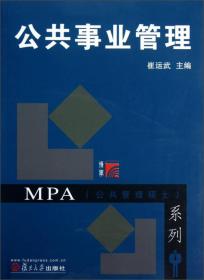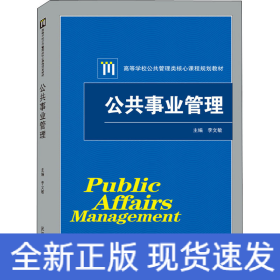
【现货!】公共事业管理专业英语 李丹 清华大学出版社
二手会有少量涂画,整体不影响再次阅读使用!套装不一定齐全,请下单前咨询在线客服!
¥ 4.4 1.6折 ¥ 28 八五品
仅1件
作者李丹
出版社清华大学出版社
ISBN9787302425205
出版时间2016-02
版次1
装帧平装
开本16开
纸张胶版纸
页数209页
字数99999千字
定价28元
货号9787302425205
上书时间2024-12-03
- 在售商品 暂无
- 平均发货时间 8小时
- 好评率 暂无
- 最新上架
商品详情
- 品相描述:八五品
- 商品描述
-
基本信息
书名:公共事业管理专业英语
定价:28.00元
作者:李丹
出版社:清华大学出版社
出版日期:2016-02-01
ISBN:9787302425205
字数:292000
页码:209
版次:
装帧:平装
开本:16开
商品重量:
编辑推荐
内容提要
本书以公共事业管理专业知识为核心,系统梳理了西方公共事业管理相关理论的发展过程、主要流派及其代表性观点。用英文全面介绍了中国主要公共事业,包括教育、科技、文化、卫生等管理的相关内容。此外,本书着眼于理论与实践的有机结合,在内容上创新性地增加了与公共事业管理实践密切相关的实用英语,如:党和国家主要机构的英文介绍、与中国国情密切相关的政治、经济英文词汇、专业英文文献的查阅与整理方法、毕业论文写作中英文翻译技巧以及就业过程中的面试英语、英文商务信函的写作等。本书既注重专业性与学术性,也突出实用性与趣味性,对于实现“用英语深化专业知识”与“通过专业学英语”的有机结合,提高公共事业管理人才的专业素养与英语运用能力具有重要的现实价值。 本书适合作为高等学校公共事业管理、行政管理、社会保障等公共管理类相关专业的教学与研究用书,也可作为广大公务员和社会组织人员以及任何对公共事业管理专业英语感兴趣人士的学习参考用书或培训用书。
目录
Chapter Introduction to Public Service Management 11.1 What Is Public Service? 11.1.1 Definition of Public Service 11.1.2 Characters of Public Service 11.1.3 History of Public Service 11.2 Publicness of Public Service 31.2.1 Academic and Practical Research on Publicness of Public Service 31.2.2 Obstacles in Pursuing Publicness of Public Service 41.2.3 Suggestions and Solutions 41.3 Public Service in the Development of Public Administration Science 61.3.1 The Old Public Administration 61.3.2 The New Public Management 71.3.3 The New Public Service 71.4 What is Public Service Management? 101.4.1 Definition of Public Service Management 101.4.2 Public Service Motivation 101.5 Control of Public Service Quality 13Chapter 2 Public Service Provision in China 172.1 Public Service Units in China 172.1.1 What Is Public Service Unit? 172.1.2 How the PSUs Operate? 172.2 Public Service Provision in China—Science and Technology Services 202.2.1 The Basic Regulation on Science and Technology Services 202.2.2 Development of Science and Technology Services in China 212.3 Public Service Provision in China—Education Services 242.3.1 Basic Regulation on Education Services 242.3.2 Development of Education Services in China 252.4 Public Service Provision in China—Public Cultural Services 292.4.1 Definition and Contents of Public Cultural Services 292.4.2 Managing Organs of Public Cultural Services in China 302.4.3 Development of Public Cultural Services in China 302.5 Public Service Provision in China—Public Health Services 332.5.1 Basic Public Health Service in China 332.5.2 The Development of Public Health Service in China 34Chapter 3 The Essence of Classics in Public Service Management 383.1 History of Administrative Theories 383.1.1 Initial Period (1887—1918) 383.1.2 Orthodox Period (1919—1945) 403.1.3 Criticizing and Transforming Period (1946—1959) 403.1.4 Period of Application and Development (1960s—1970s) 413.1.5 Challenging and Creative Period (1970s—1980s) 423.1.6 Summarizing and Probing Period (1980s—) 433.2 The Essence of Classics in Public Service Management 483.2.1 The Study of Administration 483.2.2 Politics and Administration 523.2.3 The Principles of Scientific Management 533.2.4 14 Principles of Management 603.2.5 The Science of Muddling Through 633.2.6 Reinventing Government: How the Entrepreneurial Spirit is Transforming the Public Sector 663.2.7 The New Pubic Service: Serving Rather than Steering 74Chapter 4 Political Party and State Organ 844.1 Political Party 844.1.1 An Overview of Political Party 844.1.2 The Ruling Political Party of People’s Republic of China 874.1.3 The Registered Minor Parties in People’s Republic of China 934.1.4 Chinese People’s Political Consultative Conference 964.2 State Organ 1004.2.1 An Overview of State Organ 1004.2.2 Legislative Branch 1014.2.3 The Presidency 1044.2.4 Executive Branch 1084.2.5 Judicial Branch 1254.2.6 Military Branch 1344.3 Official Positions in the Communist Party of China and State Organs of People’sRepublic of China 1384.3.1 Official Positions in the Communist Party of China 1384.3.2 Official Positions in the Legislative Branch 1424.3.3 Official Positions in the Presidency 1434.3.4 Official Positions in the Executive Branch 1444.3.5 Official Positions in the Judicial Branch 1484.3.6 Official Positions in the Military Branch 148Chapter 5 Academic English 1515.1 Conducting an Effective English Literature Search 1515.1.1 Definition of English Literature Search 1515.1.2 Reasons for Doing English Literature Search 1525.1.3 Rules and Steps to Do Academic English Literature Search 1535.2 Performing an Academic English Literature Review 1635.2.1 Definition of a Literature Review 1635.2.2 Contents of a Literature Review 1645.2.3 Steps to Do an Academic English Literature Review 1655.3 English Language Skills in Thesis and Dissertation Writing 1675.3.1 Title of Thesis and Dissertation in English 1675.3.2 Abstract of Thesis and Dissertation in English 170Chapter 6 English at Work 1726.1 English in the Interview 1726.1.1 Personal Information 1726.1.2 Education Background 1746.1.3 Experiences and Potentialities in Work 1756.2 How to Write E- 1816.2.1 Subject Header 1816.2.2 Salutation 1826.2.3 Titles and Greetings 1826.2.4 Introducing Yourself 1836.2.5 Start the Letter 1856.2.6 Closing Sentence 1866.3 How to Write a Successful CV 1896.3.1 What Is a CV? 1896.3.2 When Should a CV Be Used? 1906.3.3 What Information Should a CV Include? 1906.3.4 What Makes a Good CV? 191Appendix 196References 208
作者介绍
序言
-

【封面】
相关推荐
— 没有更多了 —





















以下为对购买帮助不大的评价